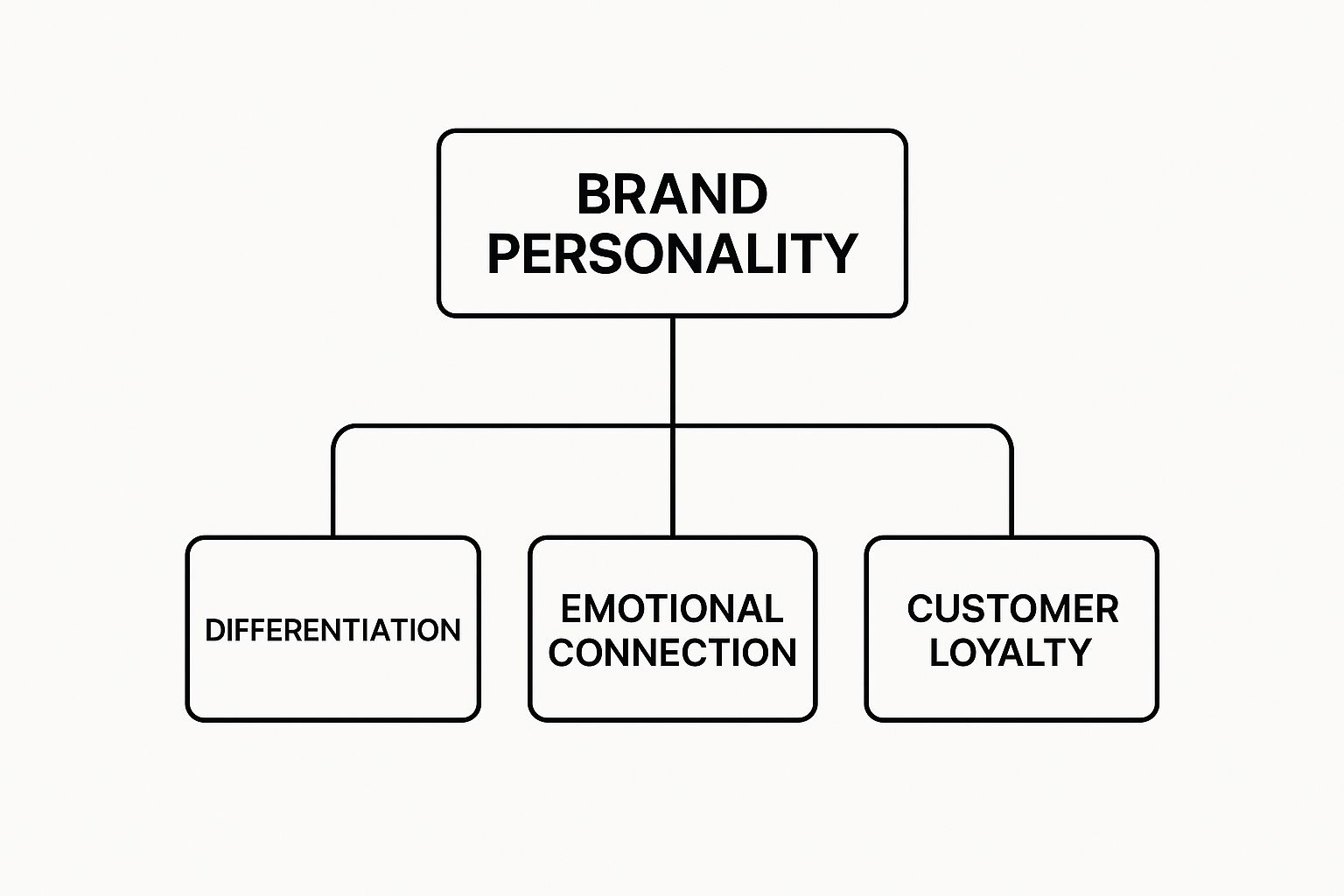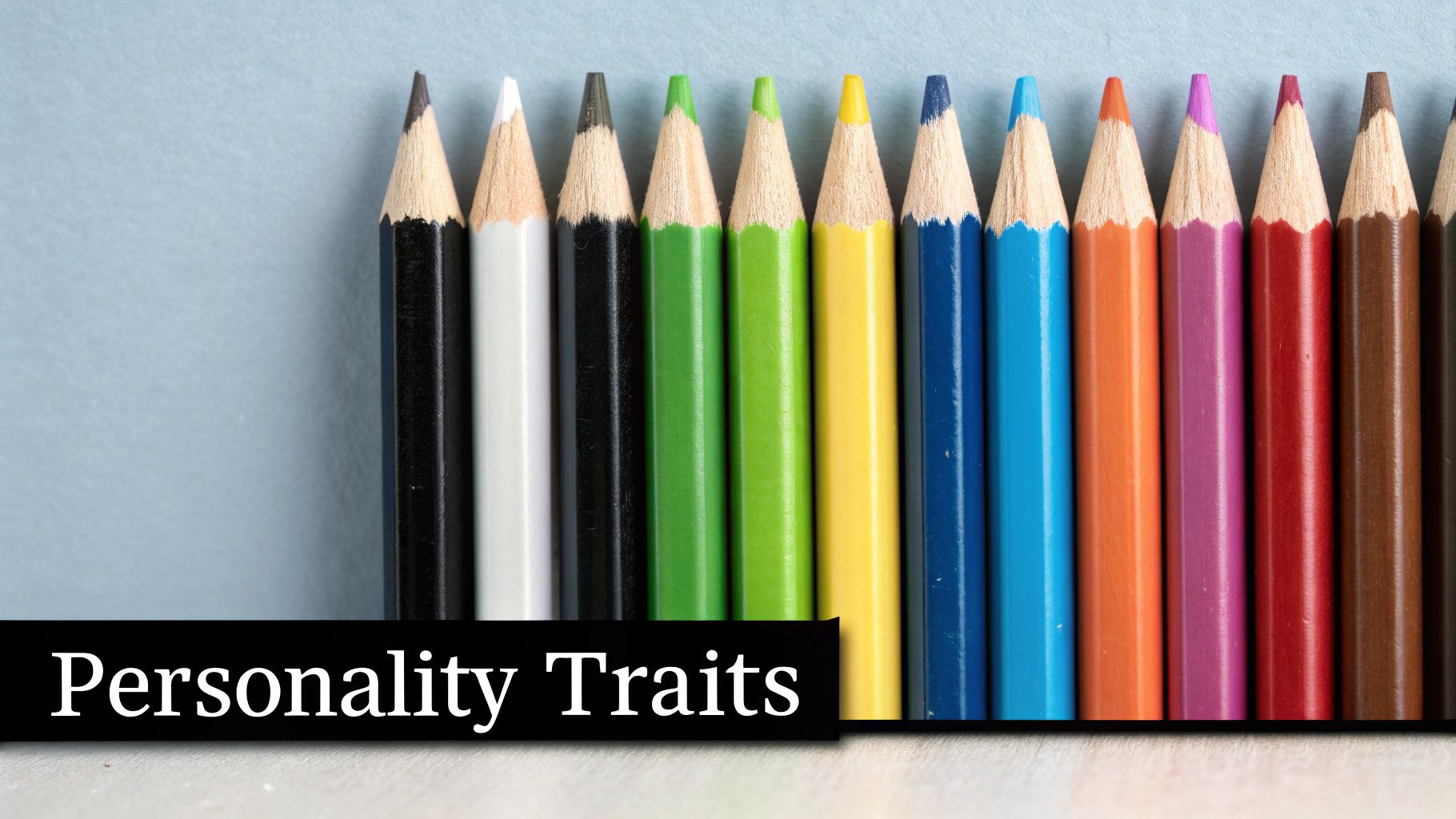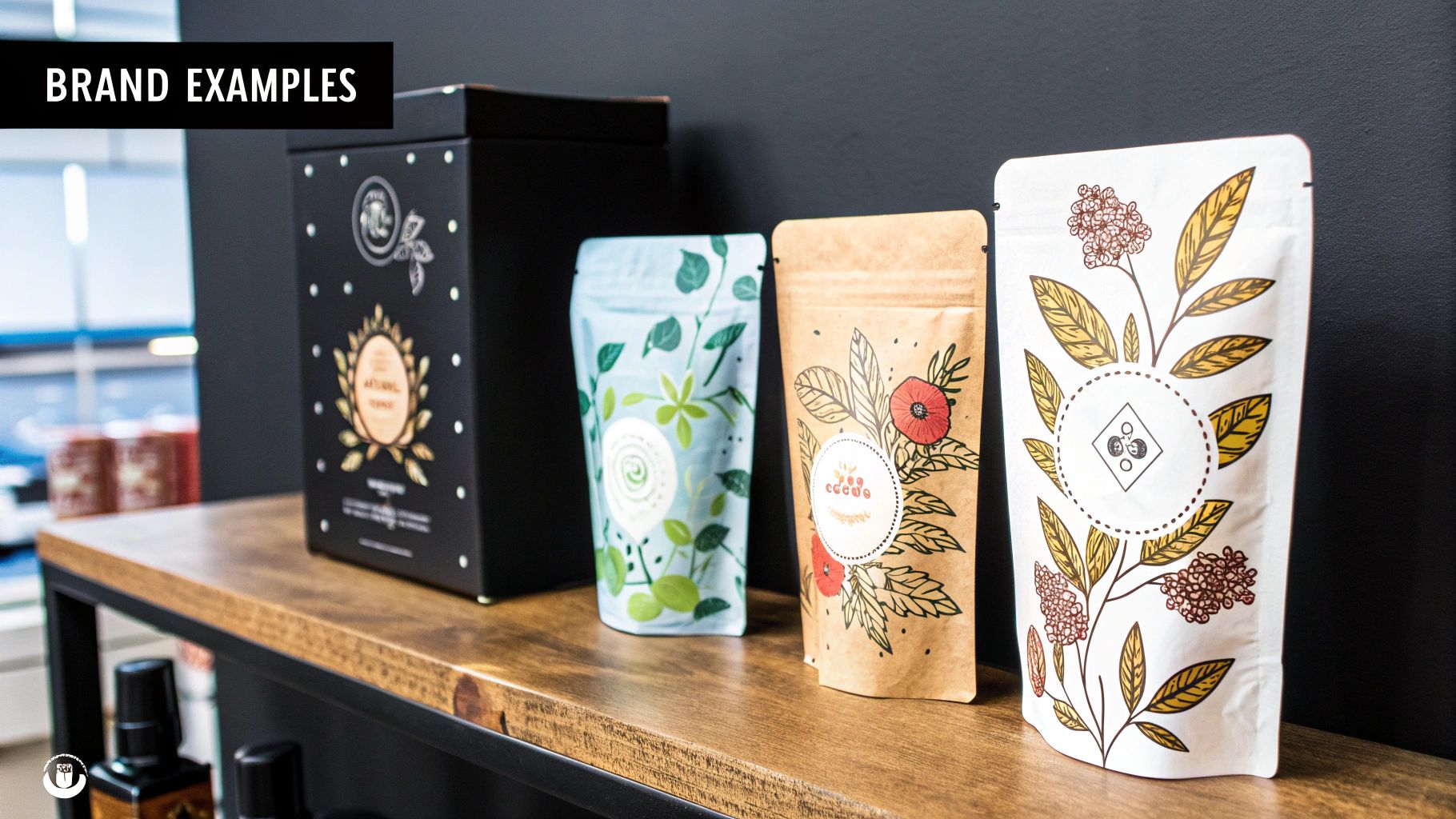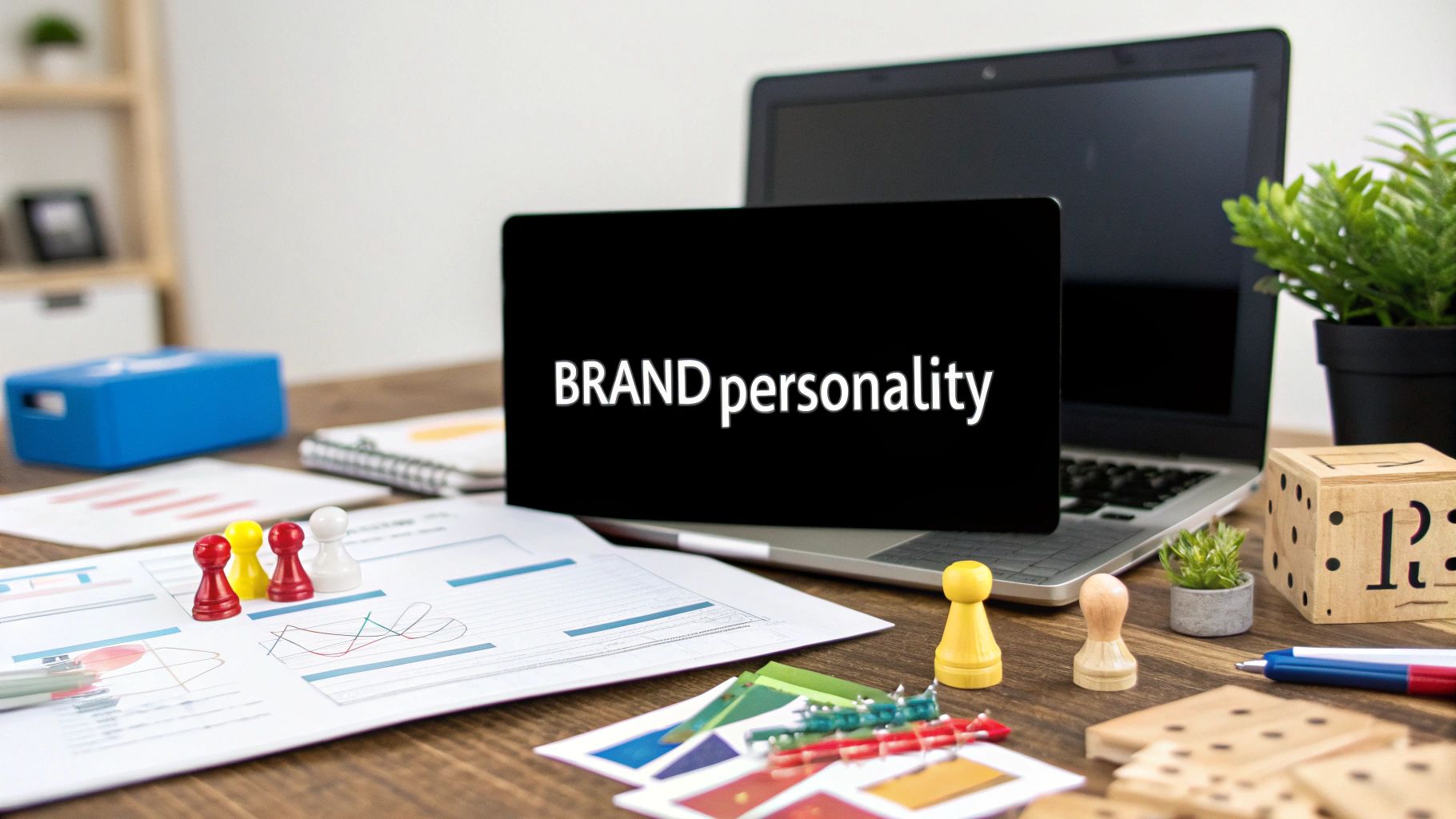If your brand were a person, who would it be? Would it be the witty, playful friend like Wendy's, always ready with a clever comeback? Or maybe the sophisticated, innovative type, like Apple? This is the essence of brand personality: the unique mix of human traits and emotions that define who your company is at its core.
It’s not about what you sell. It’s about who you are.
So, What Is Brand Personality, Really?

Think of brand personality as your company’s soul. It runs much deeper than your logo or color palette—those are just parts of your visual identity. Your personality is the character that shapes how your brand speaks, acts, and shows up in the world. It’s what makes your brand feel relatable, memorable, and human.
This idea was really solidified back in 1997 when researcher Jennifer Aaker developed her famous framework. She outlined five key dimensions of brand personality: sincerity, excitement, competence, sophistication, and ruggedness. This model gave us a tangible way to think about how brands can connect with people on an emotional level.
The Bedrock of Customer Connection
Why does any of this matter? Because a strong brand personality turns simple transactions into real relationships. When people see a bit of themselves in your brand's personality, they’re far more likely to stick around and become loyal fans.
This personality helps your audience subconsciously answer questions like:
- Is this brand down-to-earth and honest (Sincerity)?
- Is it imaginative and full of energy (Excitement)?
- Is it smart and dependable (Competence)?
Every piece of content you create—from your website copy to your social media posts—should be infused with this personality. It’s the invisible thread that ties everything together, making every interaction feel genuine and consistent.
A brand's personality is the gut feeling people have about you. It's the difference between being just another company and becoming a brand that people actively want in their lives.
Ultimately, a well-defined personality is your secret weapon for standing out. In a sea of competitors offering similar products, your unique character is what will make you unforgettable. To see how this fits into the bigger picture, check out our guide on the differences between brand identity and brand image—understanding this is key to building a truly cohesive brand.
Exploring the Five Brand Personality Dimensions
Trying to pin down something as human as "personality" for a brand can feel a bit like trying to catch smoke. Thankfully, we have a solid map to guide us. Back in the '90s, Stanford researcher Jennifer Aaker developed a framework that breaks brand personality down into five core dimensions. This has become the go-to model for understanding how brands act and feel in the real world.
Think of these dimensions less like rigid boxes and more like primary colors. Your brand might be a bold, pure red, or it could be a unique shade of lavender mixed from a few different "colors." The framework just gives you a starting point to intentionally shape how customers see you.
This is a big deal because a well-defined personality is what drives real business results.

As you can see, a distinct personality helps you stand out, forge genuine emotional bonds with your audience, and build the kind of loyalty that lasts.
The Five Core Dimensions
Getting a handle on these five dimensions is the first real step to building a brand that connects. Each one taps into a different set of human traits that people instinctively understand and relate to. Let's break them down.
Sincerity: This is your down-to-earth, honest, and wholesome friend. Sincere brands feel trustworthy and family-oriented. They give you a sense of warmth and comfort, like you can always count on them.
Excitement: These are the daring, spirited, and imaginative brands. They’re the trendsetters, buzzing with youthful energy and a sense of adventure. They connect with people who are always looking for the next big thing.
Competence: A competent brand is reliable, smart, and successful. These are the leaders, the experts you trust to get the job done right without any fuss. They inspire confidence through sheer capability.
A brand's personality isn't just a marketing tactic; it's a promise. It tells customers who you are and what they can consistently expect from every interaction, building a foundation of trust.
Sophistication: Think upper-class, charming, and elegant. Sophisticated brands tap into our aspirations for luxury, status, and glamour. Everything about them is polished and carries an air of exclusivity.
Ruggedness: Finally, we have the outdoorsy, tough, and authentic brands. Ruggedness is all about strength, nature, and durability. These brands appeal to a desire for something real and built to last, not something delicate or flashy.
The Five Dimensions of Brand Personality
Seeing these dimensions side-by-side really helps clarify how different they are. Here’s a quick breakdown of each one, along with a few iconic brands that have absolutely nailed their personality.
This table is a great tool for figuring out where your own brand fits in—or where you want it to be. By understanding these proven categories, you can start building a personality that feels authentic to you and also perfectly positioned to attract the right people.
Why a Strong Brand Personality Drives Growth

Defining a brand personality is way more than just a fun creative exercise; it’s a fundamental driver of business growth. Let's be honest, in today's crowded market, most products and services start to look the same. A distinct personality is what helps your brand cut through all that noise.
It’s an emotional shortcut. That human touch is what makes a brand feel instantly recognizable and relatable, and it's the real difference between a brand people remember and one they forget.
Building Trust Through Authenticity
Trust is everything. When a brand’s personality feels real and genuine, it lays the groundwork for a lasting relationship with its customers. People don’t just buy what you sell; they buy into who you are.
The data backs this up. A staggering 86% of shoppers say they prefer brands with an authentic and honest personality. On top of that, 89% of shoppers stick with brands that share their values. This shows a direct line from your brand’s personality to keeping customers loyal.
This isn’t just about feeling good—it’s a strategic asset that directly impacts your bottom line.
A brand personality is a promise of a consistent experience. It tells customers, "This is who we are, and this is what you can always expect from us," turning casual buyers into loyal advocates.
Gaining a Competitive Advantage
A strong personality is a huge piece of effective brand positioning strategies. It gives people a solid reason to choose you over a competitor, even when your products are almost identical. Think about it: why do you pick one coffee shop over another? It's often the vibe, the feeling you get, the personality.
This is how you stand out. A clear personality delivers three key advantages:
- Increased Memorability: A unique character sticks in people's minds, making your brand the first one they think of.
- Stronger Customer Loyalty: When customers vibe with your brand's personality, they don't just come back—they tell their friends.
- Higher Perceived Value: A well-defined personality can make your brand feel more premium and trustworthy, which can justify a higher price tag.
In the end, your brand's personality is what turns a business into something people can actually connect with. That emotional bond is the secret to real, sustainable growth.
How to Define Your Own Brand Personality
Turning the abstract idea of a "brand personality" into something you can actually use can feel like trying to nail Jell-O to a wall. But it’s a crucial step. This is where you move from theory to reality, shaping a character for your brand that guides everything from your social media posts to your customer service scripts.
The whole process is a mix of looking inward at your company's heart and outward at the people you want to serve. By asking the right questions, you can piece together a personality that feels genuine to your mission and strikes a chord with your ideal customer.
Start with Your Core Foundation
Before you can decide who your brand is, you need to be rock-solid on what it stands for. Your personality has to be an authentic reflection of your company's DNA, not just some character you've made up. If your actions don't match your personality, people will see right through it.
Start by digging into these three pillars:
- Your Mission: Why do you exist, really? Beyond making money, what problem are you genuinely passionate about solving for your customers?
- Your Vision: What does the future look like if you succeed? What's the ultimate impact you want to have on your industry or even the world?
- Your Values: What are the 3-5 non-negotiable principles that guide every decision your company makes? These are the things you'd stick to no matter what.
Answering these questions gives you the raw ingredients for your brand’s character. For example, a company with a mission to make complex tech simple for everyone will naturally lean toward a personality that’s competent and sincere.
Understand Who You Are Talking To
Your brand personality isn't just for you; it’s for them—your audience. It has to connect with a specific group of people. That means you need to know them better than just their age and location. What do they dream about? What keeps them up at night? What makes them laugh?
The personality that kills it with Gen Z on TikTok will fall completely flat with C-suite executives on LinkedIn. Do your homework. Research your audience to figure out what traits they look up to and what kind of conversations they want to be a part of. This ensures your brand feels less like an ad and more like a friend they actually want to listen to. Using a structured questionnaire is a great way to define your brand and its audience and gather these essential insights.
Use Creative Brainstorming Prompts
Okay, time for the fun part: bringing this character to life. Get your team together and use some creative exercises to get the ideas flowing. It’s all about moving from abstract values to real, tangible personality traits.
If your brand walked into a party, how would it act? Is it the life of the party, a quiet observer in the corner, the witty intellectual, or the helpful host making sure everyone has a drink? This simple exercise can reveal a ton about your brand's natural social style.
Here are a few more questions to get the conversation started:
- What three words should customers always use to describe us?
- If your brand were a person, what would be their go-to conversation starter?
- Which celebrity or famous character just feels like your brand?
- What kind of car would your brand drive? A reliable Subaru or a sleek Tesla?
The answers will help you build a detailed character sketch. If you get stuck, bringing in a brand strategy consultant can offer a valuable outside perspective. Finally, take everything you've learned and boil it down into a clear, simple brand personality statement that your whole team can use as their North Star.
Bringing Your Brand Personality to Life

A well-defined brand personality is worthless if it just sits in a strategy document on a shared drive. Its real power is unleashed when you bring it to life, making your brand’s character felt in every single interaction. This is where execution becomes everything.
Your personality shouldn't be a concept; it has to be an experience. From the copy on your website to the tone of a social media post to how your team answers a customer service email, every touchpoint is a chance to reinforce who you are.
Infusing Personality into Every Interaction
Think about a brand like Apple. Its personality—sophistication and competence—isn't just found in its sleek product design. It's in the minimalist store layouts, the knowledgeable support staff, and the intuitive user interface. Apple masterfully weaves its character into every detail, creating a seamless brand experience that just feels right.
To pull this off, you have to translate abstract personality traits into tangible actions and communication styles. Here are a few key areas to focus on:
- Visuals: Your imagery, color palette, and fonts should all echo your brand’s character. A rugged brand might use earthy tones and bold, strong fonts. A sophisticated one would lean on clean lines and elegant typography.
- Tone of Voice: How does your brand sound? Is it witty and playful, or professional and authoritative? Define this voice and use it everywhere—in blog posts, ads, and even your automated email responses.
- Customer Service: Every support ticket or phone call is a direct expression of your personality. A sincere brand should be empathetic and patient. An exciting brand might be energetic and enthusiastic.
Consistency is what makes a brand personality believable. When your audience experiences the same character traits over and over, they start to trust that your brand is who it says it is.
The goal is to ensure that no matter where or how a customer interacts with you, they get the same distinct feeling. This unwavering repetition is what builds recognition and, more importantly, trust. For a deeper dive, explore our guide on what brand consistency is and why it matters to see how it all connects.
Focusing on Sincerity and Competence
While all five personality dimensions have their place, not all of them pack the same punch when it comes to building brand equity. Meta-analytical research covering numerous studies has found that two dimensions consistently outperform the others in shaping positive brand attitudes worldwide: sincerity and competence.
These traits have a more substantial positive effect than excitement, sophistication, or ruggedness. You can read more about these brand personality findings and their impact on customer equity.
What this tells us is that while being exciting or sophisticated is great, building a foundation on being trustworthy and reliable often yields the greatest returns. This gives you a strategic focus for your efforts. By prioritizing actions that showcase your brand as both honest and capable, you connect with customers on a fundamental level, turning your brand personality from a simple concept into a powerful asset.
Common Questions About Brand Personality
Once you start digging into brand personality, a few questions almost always come up. It's totally normal. Getting these sorted out is crucial before you can really put these ideas to work for your own brand.
Let's clear the air and tackle some of the most common sticking points with straightforward answers.
What’s the Difference Between Brand Personality and Brand Identity?
This is a big one, and it's easy to get them mixed up.
Think of it like this: brand identity is what your brand looks like, while brand personality is who your brand is. They're two sides of the same coin, working together to create a complete picture.
Brand identity is all the visual stuff—the tangible elements people see and recognize. It’s your brand’s outfit.
- Logo: The symbol everyone knows you by.
- Color Palette: Your signature color scheme.
- Typography: The fonts you use everywhere.
Brand personality, on the other hand, is the human character behind it all. It’s the feeling people get from you. It’s the voice in your emails, the tone of your social media posts, and the way you interact with the world.
A great example is Coca-Cola. Its identity is that classic red and white logo with the iconic script font. Its personality, though, is all about happiness, friendship, and a touch of nostalgia. The identity is just the visual expression of that personality.
Can a Brand's Personality Evolve Over Time?
Absolutely. And it should. Just like people grow and change, so do brands. The key is to do it thoughtfully, not just on a whim. Changing your personality constantly will confuse your audience and make you seem unreliable.
But sometimes, a change is necessary. A major shift in your company's mission, a new audience you want to reach, or big changes in the market can all be good reasons to evolve.
Look at Old Spice. For decades, it was your grandpa's aftershave. Then, it masterfully shifted its personality to be hilarious, self-aware, and ultra-masculine, capturing a whole new generation of younger customers. The change was strategic and bold, but it worked because it was consistent.
A brand's personality can adapt, but its core values should stay the same. Evolution is about staying relevant, not forgetting who you are.
How Do You Measure the Success of Your Brand Personality?
Measuring something as "soft" as personality might seem tricky, but it's not impossible. Success here means one thing: the way your customers see you matches the personality you're trying to project.
You're not just guessing, either. Here are a few ways to see if you're hitting the mark:
- Social Media Sentiment: Tools can analyze the tone and emotion in what people are saying about you online. Are they using words that align with your personality? Are the vibes right?
- Customer Surveys: Just ask! You can use simple surveys with questions like, "If our brand were a person, how would you describe them?" or "What three words come to mind when you think of us?"
- Brand Association Tests: This is a classic market research trick. See what words, feelings, or images people naturally connect with your brand when they hear its name.
- Engagement Metrics: A personality that truly resonates with people usually sparks a fire. You'll see more likes, comments, shares, and a community of loyal fans forming around your brand.
By keeping an eye on these clues, you can get a really clear picture of whether your brand's personality is actually connecting with people in the way you hoped.
Ready to build a brand personality that captivates your audience and drives growth? At Softriver, we specialize in crafting custom logos and brand identities that bring your unique character to life. Get a professional brand identity that reflects your vision.







